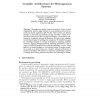Free Online Productivity Tools
i2Speak
i2Symbol
i2OCR
iTex2Img
iWeb2Print
iWeb2Shot
i2Type
iPdf2Split
iPdf2Merge
i2Bopomofo
i2Arabic
i2Style
i2Image
i2PDF
iLatex2Rtf
Sci2ools
LCPC
1995
Springer
1995
Springer
Compiler Architectures for Heterogeneous Systems
Heterogeneous parallel systems incorporate diverse models of parallelism within a single machine or across machines and are better suited for diverse applications 25, 43, 30]. These systems are already pervasive in industrial and academic settings and o er a wealth of underutilized resources for achieving high performance. Unfortunately, heterogeneity complicates software development. We believe that compilers can and should assist in handling this complexity. We identify four goals for extending compilers to manage heterogeneity: exploiting available resources, targeting changing resources, adjusting optimization to suit a target, and allowing programming models and languages to evolve. These goals do not require changes to the individual pieces of existing compilers so much as a restructuring of a compiler's software architecture to increase its exibility. We examine six important parallelizing compilers to identify both existing solutions and where new technology is needed.
Compilers | Heterogeneity Complicates Software | Incorporate Diverse Models | LCPC 1995 | System Software |
Related Content
| Added | 26 Aug 2010 |
| Updated | 26 Aug 2010 |
| Type | Conference |
| Year | 1995 |
| Where | LCPC |
| Authors | Kathryn S. McKinley, Sharad Singhai, Glen E. Weaver, Charles C. Weems |
Comments (0)

